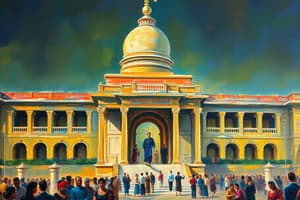Podcast
Questions and Answers
What is the supreme authority in India?
What is the supreme authority in India?
- Constitution (correct)
- Parliament
- Judiciary
- Government
What is the nature of the structure of Government in India?
What is the nature of the structure of Government in India?
- Unitary
- Hierarchical
- Federal (correct)
- Confederal
How many tiers of Government are there in India?
How many tiers of Government are there in India?
- Two
- Three (correct)
- Four
- Five
What is the provision in the constitution that prohibits arbitrary collection of tax?
What is the provision in the constitution that prohibits arbitrary collection of tax?
Which list contains matters in respect of which the Central Government has the exclusive right to make laws?
Which list contains matters in respect of which the Central Government has the exclusive right to make laws?
Which article gives the authority to enact law and levy taxes and duties?
Which article gives the authority to enact law and levy taxes and duties?
What is the purpose of the Seventh Schedule?
What is the purpose of the Seventh Schedule?
What is the total number of articles in the Indian Constitution?
What is the total number of articles in the Indian Constitution?
Which of the following matters is covered under List I (Union List)?
Which of the following matters is covered under List I (Union List)?
What is the number of schedules in the Indian Constitution?
What is the number of schedules in the Indian Constitution?
Which list contains matters in respect of which both Central and State Governments have powers to make laws?
Which list contains matters in respect of which both Central and State Governments have powers to make laws?
Which of the following matters is covered under List II (State List)?
Which of the following matters is covered under List II (State List)?
Which of the following matters is covered under List III (Concurrent List)?
Which of the following matters is covered under List III (Concurrent List)?
What is the significance of List I (Union List)?
What is the significance of List I (Union List)?
Flashcards are hidden until you start studying
Study Notes
Constitutional Framework of Indirect Taxes before GST
- The Indian Constitution is supreme, and all laws and actions of the Government are subordinate to it.
- The Constitution provides that no tax shall be levied or collected except by authority of law.
Structure of Government in India
- India has a federal structure, with a bifurcation of powers between the Union and States.
- The Government of India (Central Government) has certain powers in respect of the whole country.
- Each state (and union territory) has certain powers in respect of that particular state (Union territory).
- India has a three-tier federal structure, comprising the Union Government, State Government, and Local Government.
Power to Levy Taxes and Duties
- The power to levy taxes and duties is distributed among the three tiers of Government, in accordance with the provisions of the Indian Constitution.
Provisions of Constitution Regarding Taxation
- Article 265: No tax shall be levied or collected except by authority of law, prohibiting arbitrary (random) collection of tax.
- Article 246: The authority to enact law and levy taxes and duties is given by the Constitution, with the Parliament having the power to make laws for the whole of India or any part of the territory of India, and the State legislature having the power to make laws for whole or part of the State.
- Seventh Schedule (to Article 246): Contains three lists that enumerate the matters under which the Union and State Governments have the authority to make laws.
Seventh Schedule Lists
- List I (Union List): The Central Government has the exclusive right to make laws in respect of any matter covered in this list, including:
- Defense of India
- Naval, military, and air forces
- Atomic energy and mineral resources
- Central bureau of intelligence and investigation
- Railways, highways, currency, RBI, post office saving bank
- Taxes on income other than agricultural income
- Duties of customs
- Corporation tax, etc.
- List II (State List): The State Government has the exclusive right to make laws in respect of matters including:
- Public order
- Police
- Local government
- Public health and sanitation
- Hospital, burials, and burial grounds
- Libraries, water, fisheries, betting, and gambling, etc.
- List III (Concurrent List): Both Central and State Governments have powers to make laws in respect of matters including:
- Criminal laws
- Criminal procedure
- Marriage and divorce
- Contracts including partnership, agency, bankruptcy, and insolvency
- Trust and trustees
- Trade unions, industrial and labour disputes, etc.
Studying That Suits You
Use AI to generate personalized quizzes and flashcards to suit your learning preferences.




